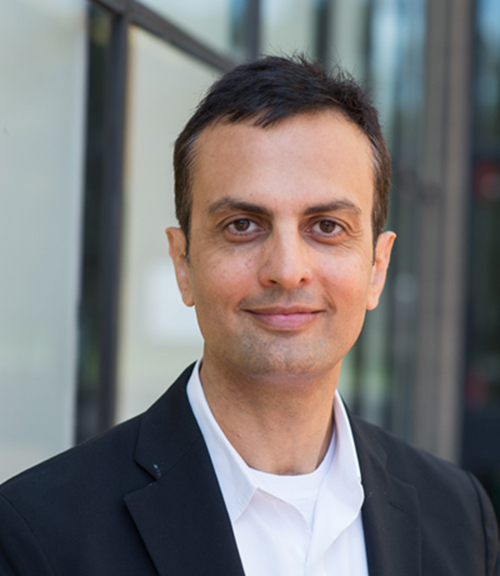Faculty Profile: Ali Malkawi

Inspired by Harvard’s University-wide commitment to energy and the environment, and by the GSD’s leading-edge environmental programs, Ali Malkawi, Professor of Architectural Technology, came to the School last July committed to advocating for energy efficient strategies while educating the next generation of GSD students in his areas of expertise: building simulation, energy conservation and sustainability. Ali is an international scholar who teaches architectural technology and computation, conducts research with the support of several prestigious grants, and consults on high-profile projects around the world.
Malkawi joins Harvard after spending 12 years at the University of Pennsylvania where he was a professor of architecture and the chairman of the graduate group in architecture, and founder and director of the TC Chan Center for Building Simulation and Energy Studies. Armed with a bachelor of science in architectural engineering and environmental design from Jordan University of Science and Technology in 1989, a master of architecture from the University of Colorado in 1990, and a PhD from Georgia Institute of Technology in architectural technology/artificial intelligence in 1994, Malkawi brings strong credentials to his vision.
Malkawi is committed to studying sustainability at a variety of scales, allowing students to understand the impact of being environmentally responsible in everything they touch, from the inner workings of a building’s systems to larger sustainable policy issues. His first course offering at the GSD this past fall, a seminar entitled “High Performance Buildings and Systems Integration,” was oversubscribed. Almost 50 students applied for a 20-person course. “I was surprised by the students’ thirst for the subject. Students were engaged in the topic and expressed a desire for more. I am encouraged to see that the subject has longevity here—it is not going to disappear.”
Reflecting upon his transition to the GSD, he says with a wide grin on his face, “It was intense.” As chance would have it, the University attracted a donor with an explicit interest in funding a green building initiative just a few short months after Malkawi arrived on campus. Given his experience in building simulation, energy conservation and sustainability, and his track record running the Chan Center, Malkawi was quickly thrown into the mix with new colleagues, University administrators, and GSD leadership to establish the Harvard Center for Green Buildings and Cities (CGBC), which was announced earlier this month as a University-wide collaboration to be officially housed at the GSD. While it was a busy fall, he is clearly satisfied with the result.
As CGBC’s director, Malkawi is collaborating with Richard Freeman, the Herbert Ascherman Professor of Economics at Harvard’s Faculty of Arts and Sciences, who will serve as co-director to guide the economic focus of the center’s work. He sees it as an opportunity to engage GSD faculty members alongside representatives from elsewhere within the University, including the School of Engineering and the Wyss Institute, to address pressing global concerns. “We hope to utilize the expertise and full resources of Harvard to become one of the most influential and comprehensive centers addressing the built environment in relation to sustainability, around the world.” While CGBC is committed to pursuing research in the following areas: modeling and building simulation; modeling and operations; macro-studies and planning; high performance materials; and finally, technology adoption and diffusion with economic, policy and legal lenses, precise research projects have yet to be defined.
The CGBC’s first year will be spent primarily on infrastructural build-up; key research projects, and a global challenge conference intended to identify the top issues that need to be researched in this arena. Other project work will begin in earnest in the second year, including a “demo retrofit project” designed to modify an actual campus building with the goal of making it the most efficient and sustainable building in the region using the resources and innovation of the center—no word yet on which one. The CGBC’s advisory board, which is almost fully formed, will be composed of 10 members from the Harvard community—seven from the University at large and three from within the GSD. CGBC reflects Harvard’s increasing efforts to address the world’s most pressing social issues with focused interdisciplinary, cross-School research teams.
Malkawi’s personal passion for sustainable design is felt most keenly when the conversation shifts away from the academy. When asked what inspires him, his smile broadens further as he praises the work and approach of Scandinavian architects. In a recent interview with the Danish Architects’ Association, he puts the LEED certification system in the United States in a global context. “We have a lot to learn from Denmark when it comes to the practice of sustainable architecture. In the US there is still a tendency to design buildings like ‘refrigerators,’ without direct natural ventilation and careful attention to lighting. Most buildings simply don’t respond to their local environments. As regulations have been lacking, a certification system for sustainable building practices came to educate and push the practice to do the correct thing.”
At the forefront of sustainable design and policy in the United States, Malkawi understands the goliath challenges we face in this country, and around the globe to shape both policy and practice. He believes that the CGBC will allow the GSD to lead diverse teams of Harvard collaborators toward strategies for promoting healthier, more productive, and more efficient buildings and cities for the 21st century and beyond.
Links:
Recent Interview with Danish Architects Association
